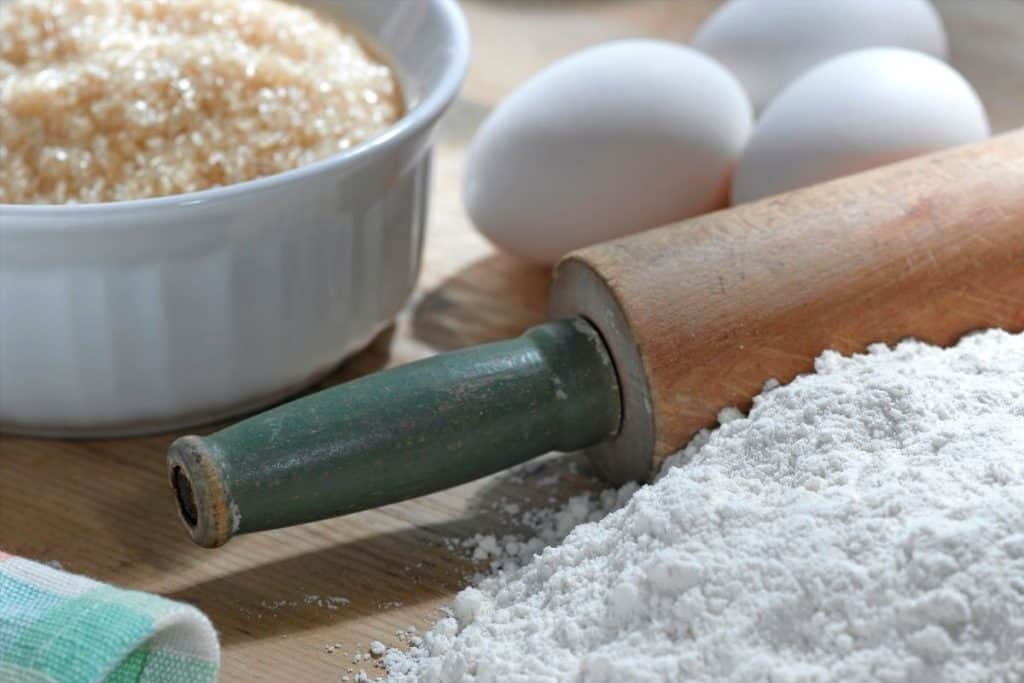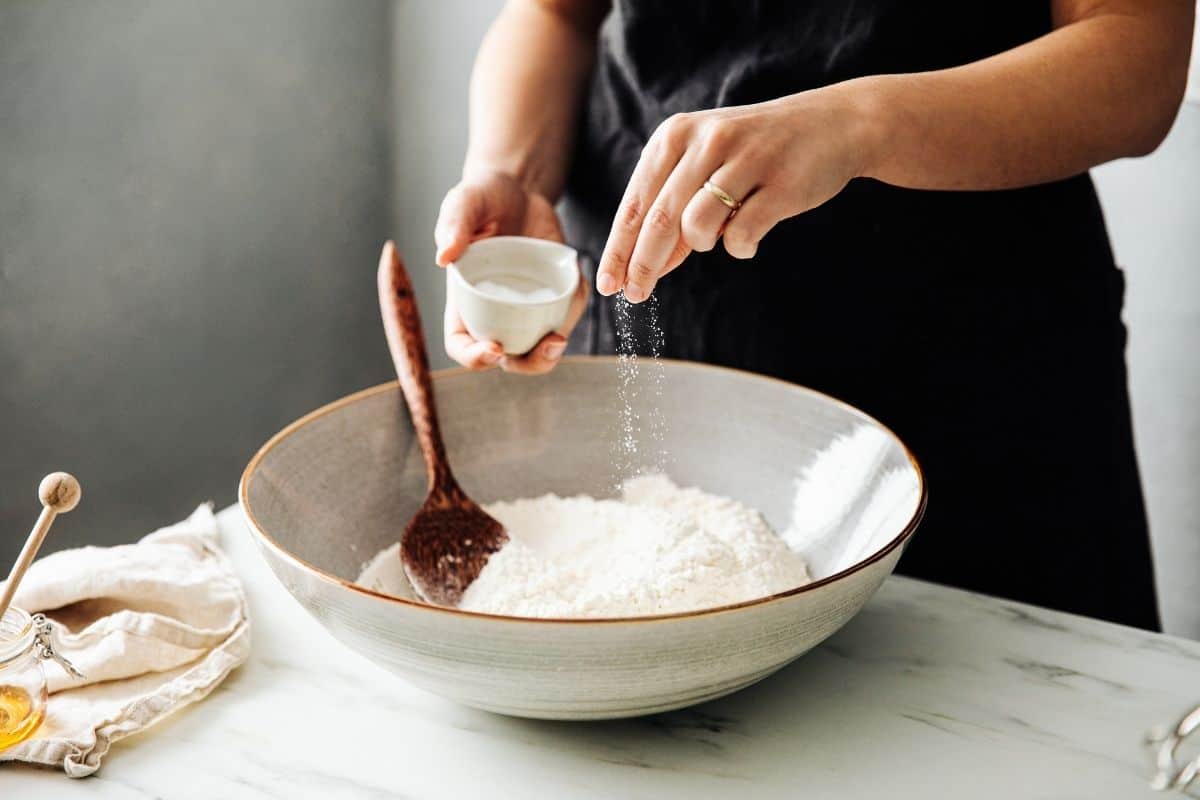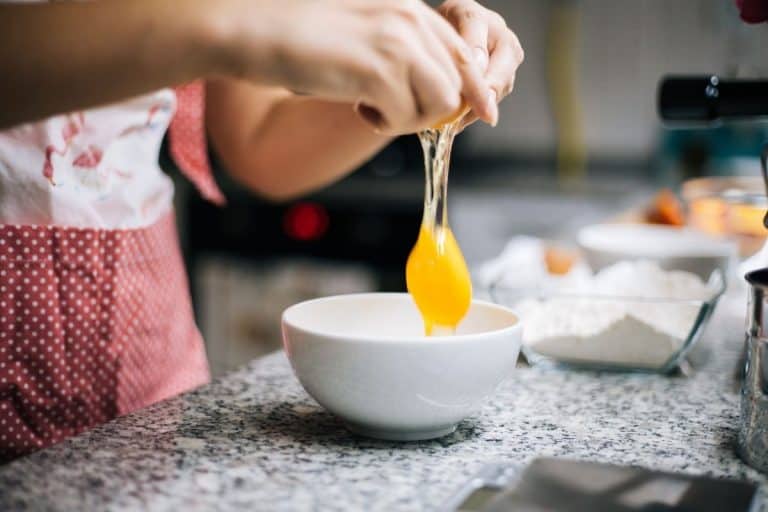What does salt do in baking? (Explained!)
Ferran Adrià, a world-renowned Spanish chef, said, “Salt is the only product that changes cuisine. There’s a big difference between food that has salt and food without it. If you don’t believe that, ask people who can’t eat salt.” BOOM!
It’s one of those profound statements that rings with truth. While it may seem like an overly dramatic statement, after all, it is just salt how much impact can it truly make? You tell us!
Try food with zero sodium and then come back here and let us know if your life doesn’t change. (Seriously try it and get back to us!) That being said, today’s focus isn’t on salt in general but what salt does in baking… let’s get into it!
When it comes to salt in baked goods most people think it doesn’t really do much. WRONG! Salt is very important in baking, it’s right on up there with eggs, butter and flour. Salt adds a “special flavor” to your cookies, bread, and cakes. The absence or lack of salt creates a black hole in our taste buds that no other seasonings or baking ingredients can satisfy — only salt can. (or MSG if you’re into that type of thing)
Read on to find out what salt does in baking.
What Does Salt Do in Baking & Why Do We Use It?
First off, let’s address what salt does in baking exactly. Salt has three main functions: firstly as an enhancer to other flavors (salty sweetness), secondly as a flavor enhancer on its own (think salted caramel), and lastly, as a preservative agent that inhibits the growth of bacteria which cause spoilage. If you don’t add any salt at all when baking your desserts, they’ll likely taste flat or overly sweetened because there’s not enough contrast.
Salt is also added to some baked goods as a chemical leavening agent. Sodium bicarbonate (baking soda) when mixed with acid produces carbon dioxide, which causes the batter to rise during baking. That’s why there is typically some salt in most types of cake recipes as well as other leavened baked goods like muffins and scones because they all contain an acidic ingredient like buttermilk, sour cream, yogurt, or lemon juice which will activate the baking soda.

Let’s take a look at some of the science behind why we use salt in baking
For this post, we are going to look at a sweet treat, cookies that require salt, and a more savory option, bread as an example of what salt can do in baking.
For cookies, salt enhances the flavor of the ingredients. Without salt, cookies would taste flat and very sugary. Most importantly, salt makes cookies chewier because it strengthens the protein in the cookie dough. This chewy texture and amazing flavor salt brings to a cookie is the reason why many people use it.
Bakers also use salt in making dough for their bread. It has four important functions from kneading the dough to munching on the bread. First, salt controls the rate of yeast fermentation and enzyme activity. Second, it strengthens the gluten which enables the dough to hold carbon dioxide, the one responsible for fermentation. Next, salt gives a nice deep brown color to the bread’s crust making it look more appetizing. Lastly, this little mineral has a big role in modifying and enhancing the flavor of the bread.
Understanding what salt does in baking and why we use it is crucial in concocting any baked goods. However, it is also equally important to understand what happens if we don’t add salt when baking.
What happens if you don’t add salt when baking?
Several things may occur if you don’t add salt to cookies or bread:
Arguably the most important factor is flavor – Your cookies or bread would taste flat. Without salt, it will be difficult to bring out the flavors of your ingredients. No one wants to eat a bland cookie or get a big ol’ bite of bread and just taste the flour.
Moisture can be an issue without salt. You may have a dry cookie or bread or end up with a soggy mess if you live in a humid environment. Salt can trap moisture in your dough; without it, your baked products may get very stale and dry. Salt also repels moisture and keeps your dough from becoming overly saturated. It is all a balancing act.
When you spend a lot of time baking you want your baked goods to last and salt will help prolong the shelflife of your favorite treats. No one wants to see their bread or cookies rotting after just a few short days. Salt can keep the freshness of your baked treats it enhances and increases shelf life.
When dealing with bread, if you try and bake it without salt, gluten cannot hold moisture, and carbon dioxide is not produced which is needed to kick start fermentation and control of yeast. This means your no-salt bread will have less volume and coarser crumbs.

An in-depth Look at What Role Salt Play in Baking
As mentioned above salt plays many roles in baking. What salt does in baking is divine. First, salt adds and enhances the flavor of baked goods. Second, it controls the growth of yeast in dough. Third, it helps baked goods last longer as it increases shelf life.
Below is the science behind the roles of salt in baking. Read on to understand how salt works.
1. Salt adds and enhances the flavor in baked goods
Salt is Mother Nature’s flavor amplifier. It can enhance the sweetness of your baked goods because salt contains ions that can neutralize bitter flavors by suppressing them; thus, making your cookies or bread taste sweeter. For example, chocolate can be bitter when added to your mixture, but a smidgen of salt can make it palatable by taking away its bitterness. Food is better with salt.
2. Salt Controls Yeast In Dough
Yeast works as a leavening agent of fermentation, which is an important part of making bread. As a leavening agent, yeast can produce the gas that makes the bread rise by feeding on the sugars and expelling carbon dioxide. Having too much yeast could cause the bread dough to go flat. The bread will rise poorly and might have a beer smell and taste. To control the growth of yeast during the fermentation process, salt is added. Water is essential for yeast activities; salt attracts water and moisture. The yeast then releases its moisture or water to the salt slowing down the yeast fermentation. It is proven that salt has a retarding effect on yeast reproductive activities.

3. Salt Helps Baked Goods Last Longer Increasing Shelf Life
Because salt is hygroscopic, it can prevent the bread from going bad and stale. The moisture that salt attracts can increase the shelf life of your bread. However, in tropical countries, salt can also make the bread soggy because of too much moisture present in the air.
What Kind of Salts Can I Use In Desserts?
Television Chefs usually use Kosher salt and coarse sea salt. If none of those are available in your kitchen, table salt will suffice. However, the volume differs between salt types and brands.
For example, one (1) tablespoon of table salt weighs 20 grams. While one (1) tablespoon of Morton Kosher Salt weighs 15 grams and a tablespoon of Diamond Crystal Kosher Salt weighs 10 grams. A tablespoon of granulated sea salt weighs 20 grams, but a tablespoon of flaky sea salt is 10 grams lighter.
It is also important to note that different types of salts vary in melting rates as well. When using salt in baking or making desserts, consider its type to properly measure how much salt you need to put in. Remember that salt is added to make your baked goods taste better; a salty taste must not be discernible.
What’s The Best Salt For Baking?
There is really no best salt for baking but the best type of salt to use varies on what you are going to bake.
Larger grain salts, such as Kosher salt and coarse sea salt, work well in baking cookies. These kinds of salt melt quickly and evenly into the cookie dough making your cookies sweet and chewy. While small grain salts such as fine sea salts work better if you are kneading dough for your bread. These kinds are easier to sift and also dissolve fast for a more balanced flavor. Moreover, small grain salts can make the bread have a deep brown crust.

Is Pink Himalayan Sea Salt Good For Baking?
You can use Himalayan salt in your baking recipes. Himalayan salt is made from the same material as table salts, but it comes with a bit of added minerals, not enough to change the flavor profile of your recipe. As stated above what matters most is the coarseness of salt that you use.
Salt in Baking fAQs
How Does Salt Affect Eggs During the Baking Process?
When eggs and salt are baked, the taste of eggs is less detectable and becomes milder. Salt also prevents the proteins in the egg from binding too tightly as they heat up, which results in soft and moist bread.
How Does Salt React with Flour in Baked Goods?
Four needs salt to become more elastic. The salt interacts with the gluten proteins in the flour and separates them, which allows for a better rise of dough during baking. Salt also serves as an antioxidant in the dough, and it also helps bring out the flavors and aromas present in the flour.
What is the purpose of salt in baking cookies?
Salt takes cookies from bleh to YUM. The salt brings out the sweetness of cookies and balances flavors. Salt also attracts moisture, preventing cookies from getting stale.

What does salt do in baking cake?
When baking a cake salt brings out the sweetness of cake and balances flavors. Just like with cookies salt also attracts moisture, preventing cakes from getting stale.
What does salt do to yeast in bread dough?
When salt is added to yeast in bread dough, it slows down the yeast’s activity, controlling the speed at which dough rises. Salt also strengthens the gluten in bread dough and helps give it a better texture, making your loaf of bread have a chewy consistency.
Can you use iodized salt for baking?
If you only have iodized salt on hand you can use it. Some people say they notice a difference in flavor, while others say that’s a load of crap. Sea salt or kosher is preferred by almost every chef.

Salt is a Key Component In Baking & Should Not Be Left Out!
Salt plays an important role in baking as it enhances flavors and improves the texture of baked goods as well as preventing spoilage with its antioxidants properties. Although all salt is used for the same purpose, there are different types of salt that give off varying tastes and textures. When purchasing salt for your recipes be sure to pick up a quality brand that does not contain any additives. The important thing is you never leave out salt in baking. Salt is the soul to your baked goods. This wondrous mineral brings life, taste, and color to your bread and cookies. What salt does in baking is simply magic.








